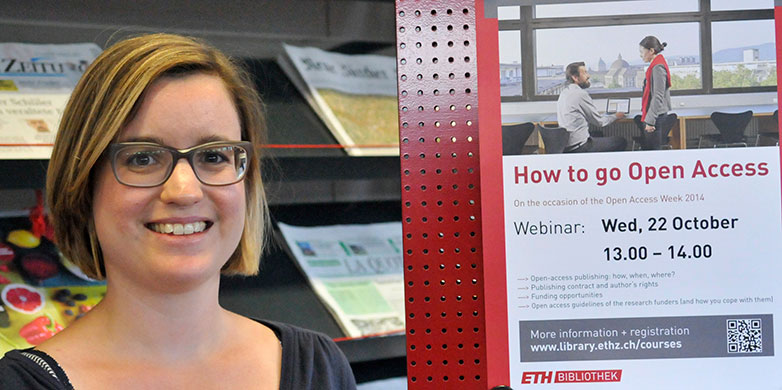The ETH-Bibliothek is constantly expanding its e-publishing services
With Open Access Week 2014 beginning today, we take a look at the ETH-Bibliothek’s work on e-publishing and digital data preservation.
Today sees the start of International Open Access Week 2014 – a global week of action during which universities, non-university research facilities, knowledge institutions and libraries will be organising events to make their employees, members and target users more aware of the purpose and benefits of Open Access. The ETH-Bibliothek is also taking part in the initiative and is this week offering a webinar on the subject (see text box). The speaker is Barbara Hirschmann, who is in charge of the e-publishing department at the ETH-Bibliothek. She says: "We want to take advantage of the momentum generated by this action week to make ETH members even more aware of our Open Access services."
Since the Executive Board decided on its Open Access policy in 2008, the ETH-Bibliothek has been steadily expanding and refining its electronic publishing and digital data preservation services. The main focus is always on the users, i.e. all the scientists at ETH Zurich who generate and publish research results. The policy encourages them to play an active part in implementing the Open Access strategy and to make their scientific work available online "as quickly as possible".
Twenty thousand documents
The most important tool for implementing the Open Access strategy is the ETH E-Collection, which went into operation in 2001: this is the central document server for the whole university that can be used by undergraduates, doctoral students and researchers as a publishing platform for their original publications and reprints, and also as a research portal. Twenty thousand documents such as dissertations and theses, reports, conference papers and articles from journals, which have all been checked with regard to legal issues by experts at the ETH-Bibliothek, are now freely available over the Internet, at no charge. The facts confirm that using this in-house publication channel enables scientists to reach a global and ever-growing readership: in 2013, the statistics showed that there had been over four million full-text downloads, mostly from Germany, closely followed by the USA, China and Switzerland.
For researchers, one of the reasons why the ETH E-Collection is so attractive is that scientific articles published here automatically appear on the ETH-Bibliothek’s Knowledge Portal and in other library catalogues, and can also be found via Google Scholar and other search engines. "We give each document a so-called Digital Object Identifier (DOI), i.e. a permanent link that means it can be accessed at all times and this also enables all documents to be cited", explains Barbara Hirschmann. This clearly has a very beneficial effect on general visibility for a publication, the number of downloads, online views and, in some cases, citations. Furthermore, the fact that the saved bibliographical data can be sent directly to the second main platform, the university bibliography ETH E-Citations, has a very practical benefit for professors and scientific staff: it means they can transfer the reference information that they have already recorded and use it on websites, CVs and in reference management programs, with no additional effort.
In the future, the system will also simplify things for institutes and laboratories which have until now maintained their own publication databases. "We have already successfully completed our first migration project and amalgamated the publications database of the Autonomous Systems Lab in the Department of Mechanical and Process Engineering into the ETH E-Collection", reports Hirschmann.
Open Access more and more important
The ETH-Bibliothek is constantly expanding and developing its e-publishing services. For Arlette Piguet, in charge of Customer Services, Open Access is an important strategic area of activity. "Publishing is going to diversify in future", she says confidently. By this she means that online publication routes will become more and more important. One of the indications of this is the increase in Open Access publications by ETH staff in quality-controlled journals: the proportion has increased from three per cent in 2007 to ten per cent last year. That is why the ETH-Bibliothek is currently considering reaching new agreements with Open Access publishers and the possibility of taking over publication costs.
Another area that is closely connected with publishing and is also becoming ever more important is digital data preservation: here, the research data itself is to be preserved for the long term and – if required – published. In this way published research results can be reproduced and the data reused.
There are also plans for a number of new projects which are designed to make the services connected with Open Access even more closely tailored to meet the needs of researchers, like merging the two tools ETH E-Collection and ETH E-Citations into a joint system, for example. There is soon also to be a pilot project to test out an infrastructure for providing technical and administrative support in the future to ETH scientists who publish their own scientific journal. Piguet: "We’re thinking about setting up a free platform for the evaluation process and editorial support which would enable ETH publishers to set up and publish academic journals without involving a commercial publishing house."
"How to go Open Access"
Webinar by the ETH-Bibliothek as part of Open Access Week 2014 from 20 to 26 October
Wednesday, 22 October, 1 p.m. to 2 p.m.
For more information and to sign up www.library.ethz.ch
This webinar, in English, will provide information about legal, financial and political aspects of Open Access publication, for example about publishing contracts and copyrights, funding options and the requirements of research sponsors (EU, SNSF). During and after the live presentation there will be an opportunity to ask questions in a chatroom, for example about the special Open Access services provided by the ETH-Bibliothek.
Information about the ETH-Bibliothek’s e-publishing and digital data preservation services can be found at: www.library.ethz.ch/publizieren: www.library.ethz.ch


